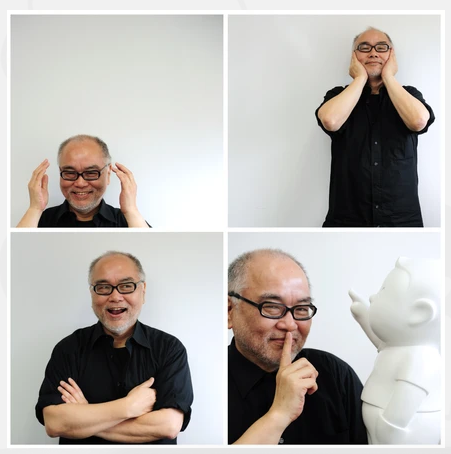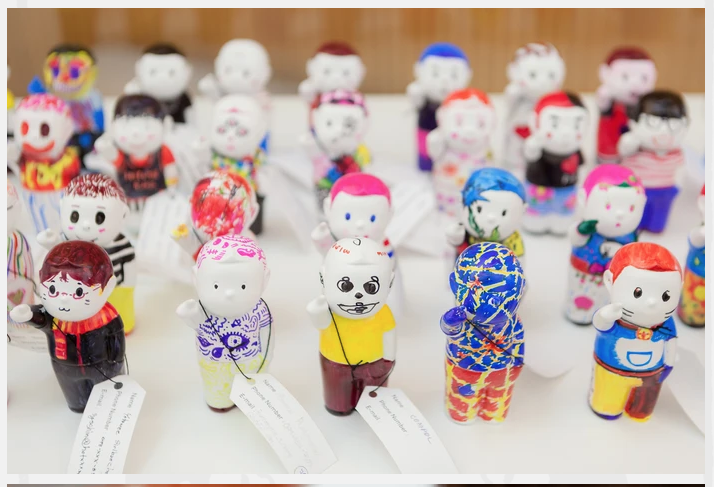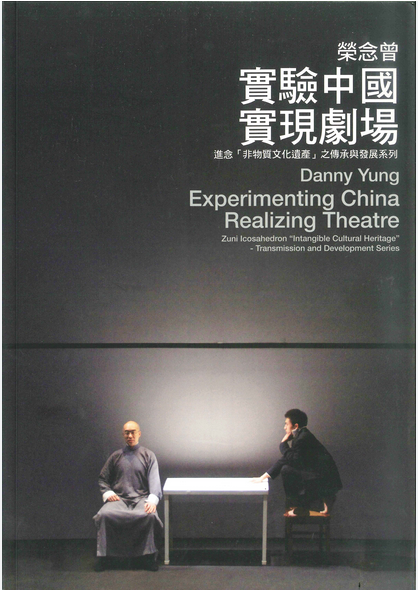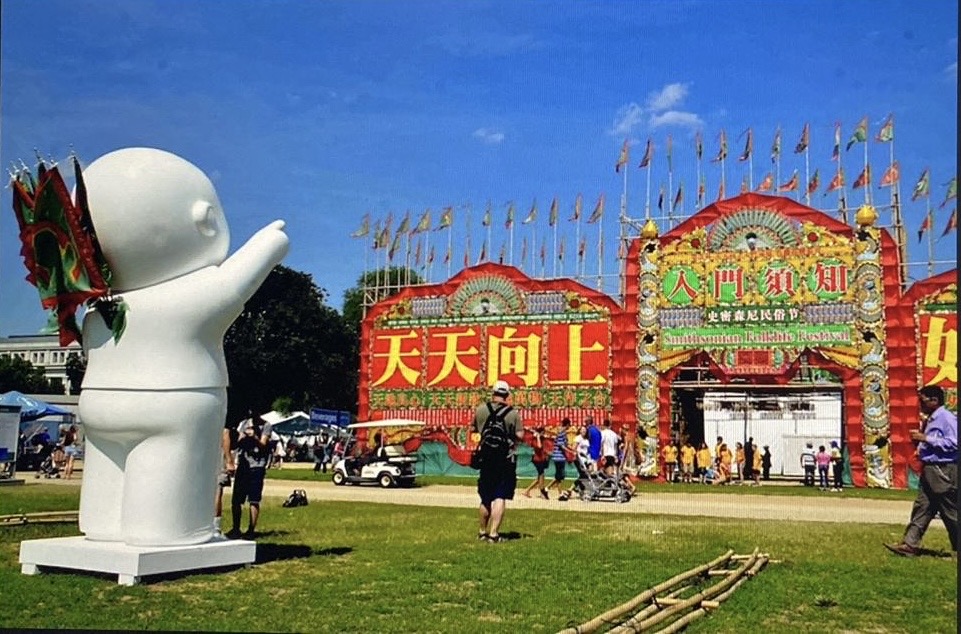TTXS Comic single frame

- Eleanor Yung
In 1969-70, with the founding of the Basement Workshop, Danny Yung created a space inclusive of diverse voices, which inspired the development of many programs and the creative growth of many people. Although he left New York in the late ‘70s, Basement’s programs, in the hands of New York’s many talented cultural and artistic activists, flourished and blossomed into generations of activities decades after.
In 1982, Danny co-founded Zuni Icosahedron, an international experimental theatre company in Hong Kong. His deep interest in art making and cultural advocacy steered the organization in many fronts, including art-in-education, performances, exhibitions, city to city conferences and international collaborations.
Through mentoring and cultivating creative thinking, Danny founded the HKICC Lee Shau Kee School of Creativity1, the only arts high school in Hong Kong. He created the “Black Box Exercise” project which he brought to Germany in 1999. And later Tian Tian Xiang Shang (TTXS) also became a major project.

Danny encouraged artists to question tradition and the norm, to explore limitations and boundaries, and to experiment and innovate. To him, the underlying basis for art making is critical thinking versus creative craftsmanship. The artists’ newfound voices often resulted in new art forms2, most notably, the Kunqu artist from Nanjing, Ke Jun, who had since written and published books on his artistic and personal journey in the growth and maturity of his performing art form.
Danny continued to “build bridges,” as he did at Basement Workshop by creating communication and cultural exchange channels. In Hong Kong, he not only “built bridges”, but also built art institutions both within Hong Kong and outside. He initiated or was part of the formative years of many cultural organizations, e.g. World Culture Forum, the Asia Arts Net, the International Network for Cultural Diversity, the Conference of Asia Foundation and Organization (CAFO), and others.

By advocating for art and culture in Hong Kong, he positioned the city as a cultural hub of Asia. And through the local and international network and institutions he helped form, he initiated and facilitated collaborative works not only in the arts, but also advocating for reforms and redefining issues on cultural matters faced by institutions, both government and non-government. Advocating for the arts and art making comes hand in hand with the building and strengthening of the cultural industry.
From “Festival of Vision,” a Hong Kong-Berlin cultural and artistic exchange, to the “Munich-Hong Kong Joint Cultural Conference” organized by the Goethe Institut, Danny began expanding networks and programming to involve other cities throughout Asia, resulting in 2017’s “Hong Kong Belt Road City-to-City Cultural Exchange Conference.” While Xi Jin-Ping created the phrase “Belt Road” for political and economic outreach, Danny was devoted to cultural and artistic expressions and exchanges. Using the network he had established, more than five thousand artists and forty cities throughout Asia collaborated in performances, educational workshops and roundtable discussions3.
From doodles in high school, to the creation of comic strips which evolved into the iconic cartoon drawing of Tian Tian Xiang Shang, this creational process is exemplary of Danny’s work to provide a platform for others. From a two-dimensional drawing, TTXS became a three-dimensional figurine inspired by Mao Tse-Tung’s saying that bears the meaning of “Everyday Striving Forward,” and provides a blank space for creativity. In the classroom, students use it to color, attaching objects, and express themselves. In the professional world of artists4 and designers, their TTXS creations have become memorable artworks. In public spaces, the monumental size inspires imagination and awe. For me, this particular project is most reflective of the nature of Basement Workshop, an organization where many diverse and creative ideas began and thrived.
From the days of Asian American Dance Theatre when Danny and I collaborated in choreographing the piece “Identification in Progress #1, #2, #3” (1974), he continued his exploration in theater making. These theater pieces were almost always multimedia productions, utilizing written and spoken languages, texts and subtexts, music, sound, and innovative and dynamic sets and design. In more recent years, the use of advanced and innovative visual technology has become an important vehicle for a complete immersive experience of sound and sight, conveying Danny’s artistic/social/political messages that are always implicit and open-ended, encouraging imagination, discussion, and interpretations5.

Danny’s works like the collaborative theater project “One Table, Two Chairs,” the cross-nations and cross-regions performances and conferences in the “Belt Road” project, the use of innovative technology in the “GiantMirror Performance,”6 and the monumental installation of “Bamboo Sheds,” inspired by traditional village theaters, focus on cultural exchanges, collaborative creativity, and artistic advocacy. All of these works deserve separate pages of discussion.
From the Basement Workshop he started 50 some years ago locally in New York’s Chinatown, Danny expanded his ideas regionally throughout Asia, extending peripherally to Europe and the Americas. His New York Chinatown became Hong Kong, then included all of China, Taiwan and Singapore, and further expanded to most of Asia promoting art making that wasn’t limited or restricted by boundaries of language, heritage, identity, geography, or social/political/national/ideological differences.
His creative work from 1970 to 2020, was chronologized and exhibited at Danny’s “50 Years Retrospective X-Xperimenting Exhibition,”7 from November 2021 to August 2022 at the Hong Kong Heritage Museum. The exhibition paid tribute and showcased Danny’s creative works stemming from the time of Basement Workshop in the early ‘70s, to new commissions in theater, film, video art, installations, visual, and multimedia presentations currently.
Danny is the recipient of multiple awards. In 2008, he was honored with the Music Theatre NOW Award by UNESCO’s International Theatre Institute. In 2009, he was conferred the Order of Merit by the Federal Republic of Germany in recognition of his contribution to the arts and cultural exchange between Germany and Hong Kong. In 2014, he received the Fukuoka Prize for Arts and Culture in Japan. And in 2015, he received the Award for Outstanding Contribution in Arts from the Hong Kong Arts Development Council.
Danny continues to generate spaces and opportunities for individual and collaborative works centering on identity in the framework of creative thinking and cultural heritage. He continues to advocate for the importance of research and reform of the creative industry, and encourages cross-culture, cross-discipline and cross-region exchanges. He continues to inspire discussions, pushing people to create and raise their voices.
1. In 2006, Danny Yung founded the HKICC Lee Shau Kee School of Creativity. The school now has 400 students enrolled. For more information, see http://www.hk-icc.org/hksc/eng/index.php and https://www.creativehk.edu.hk/.
2. An example of this work is “Flee By Night” with Kunqu artists KeJun and Yang Yang, see http://archive.zuni.org.hk/#/search-result/details/169.
3. To learn more about Danny Yung and his work in cultural exchange, see https://zuniseason.org.hk/en/z-live/cultural-exchange/.
4. Cross-discipline artists’ works. Works on 20-inch tall TTXS, 2017. Tian Tian Xiang Shang Exhibition in Singapore, and Tian Tian Xiang Shang@Vancouver in Nelson Square, featuring artists from Vancouver, other parts of North America, and Hong Kong.
5. See https://zuniseason.org.hk/en/z-live/experimental-theatre/ and https://zuniseason.org.hk/en/programme/interrupted-dream/
6. The three-year “Belt Road” project includes city-to-city cultural exchange conferences and the “GiantMirror” performances. Thirty-nine cities along the “Belt Road” participated including representation from Bangkok, Beijing, Berlin, Cardiff, Guangzhou, Hangzhou, Hat Yai, Hanoi, Hong Kong, Hyderabad, Istanbul, Jakarta, Kaohsiung, Kuala Lumpur, Macau, New Delhi, New York, Penang, Phnom Penh, Seoul, Shanghai, Shenzhen, Singapore, Tainan, Taipei, Tokyo, Yogyakarta, Zurich. See https://zuniseason.org.hk/en/z-live/cultural-exchange/.
7. Jointly presented by the Hong Kong Leisure and Cultural Services Department and Zuni Icosahedron, and organized by the Hong Kong Heritage Museum and Zuni, the Retrospective consisted of three sections: the installation GATEWAY - Flower Plaque Secret Garden, Tian Tian Xiang Shang, and the VIDEO Circle and Square. The Flower Plaque is a three-story bamboo structure displaying many of his literary as well as TTXS comic stories. TTXS exhibited the extensive collaboration and exchange from its inception as a three-dimensional figurine in 2007 until 2019. VIDEO Circle and Square features his exploration and experimentation in arts, culture, heritage preservation and development through cross-genre experiments, advocacy in international exchange, cultural policy and arts education in the past half-century. For more info and images, see https://zuniseason.org.hk/en/z-live/x-xperimenting-exhibition-danny-yung-50-year-creations.
Eleanor Yung was a co-founder of Basement Workshop, and co-founder and Artistic Director of the Asian American Dance Theatre (1974-1990), later renamed the Asian American Arts Centre (AAAC) in 1987.
Eleanor has a background in Sociology from the University of California, Berkeley, and studied Dance Education at the Teachers College, Columbia University. She has a Master of Science in Chinese Medicine, and practiced Acupuncture for twenty years before her retirement. She studied Taichi/Qigong with the late Master Ham King Koo, and taught at the Pacific College of Health and Science (formerly Oriental Medicine), the Metropolitan Museum of Art, The Clemente, and private lessons.
In 2008, Eleanor presented on, “Healing Aspect of Qi in Peking Opera,” at the NY APPAN First International Festival and Symposium: Meditation and Healing Dance & Music. Her essay, “Moving into Stillness,” appears in Chinese Women Traversing Diaspora (Routledge, 2013). She co-edited with Prof. Bell Yung, Uncle Ng Comes to America (MCCM Creations, HK, 2014), a multimedia publication on the narrative songs from southern China.
Eleanor’s oral history and dance works are archived at the Jerome Robbins Dance Division at The New York Public Library for the Performing Arts.